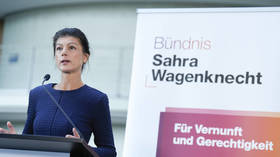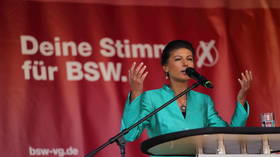German opposition leader pressing for change of course on Ukraine

Berlin should make more active diplomatic efforts if it wants the conflict between Moscow and Kiev to end, German MP Sahra Wagenknecht told Funke Media Group on Friday. “More weapons” for Ukraine will not bring peace to Europe, she argued.
The veteran politician has repeatedly criticized Chancellor Olaf Scholz’s government over its stance on the Ukraine conflict, saying Berlin’s current policy only helps to fan the flames of war.
“We need more diplomatic efforts,” said Wagenknecht, a former member of the Left Party who established her own party this year – the Sahra Wagenknecht Alliance (BSW).
“There is a good peace plan by Brazil and China. I hope that Germany and the EU will support such initiatives,” Wagenknecht said. In May, the two nations presented a joint six-point proposal calling for de-escalation, negotiations, and an international peace conference recognized by both Russia and Ukraine.
Brasilia and Beijing tried to advance their initiative at a 17-nation meeting on the sidelines of the UN General Assembly in September. Kiev immediately rejected their plan, calling it “unacceptable.” Ukrainian leader Vladimir Zelensky branded it “destructive.”
Moscow welcomed China’s and Brazil’s peace proposals and expressed appreciation that they have received international backing. It expressed doubt, however, about Kiev’s willingness to engage in talks.
In Wagenknecht’s view, Germany should put pressure on Zelensky to “force” him to agree to a certain compromise. China could exert influence on Moscow to make talks possible, she said. “There will be no peace without compromise,” the politician stated.
The lawmaker also warned that current Western policy towards the Ukraine conflict is “insanely dangerous” since it gets NATO “drawn ever deeper into this war.” If the US-led bloc becomes a party to the conflict, this would lead to a direct confrontation with Moscow, she warned. “And this conflict will then very quickly escalate into a nuclear war.”
Asked by journalists whether she is doing Russian President Vladimir Putin’s “bidding,” Wagenknecht replied that it is “not about being a friend or enemy to Russia, but about peace in Europe and [ending] the war in Ukraine.”
“Without peace, everything else is nothing,” she said, adding that it is high time Germany became “an internationally respected voice that mediates in conflicts and advocates diplomacy.”
Moscow has warned that Western military aid to Kiev drags NATO ever closer to direct involvement in the conflict. This summer, Putin said that Western support for Ukrainian strikes deep into Russian territory is a significant escalation that could spark an “asymmetric” response. Last month, he also suggested changes to Russia’s nuclear doctrine that would allow a nuclear response in case of a conventional attack by a non-nuclear state that is backed by a nuclear state.













